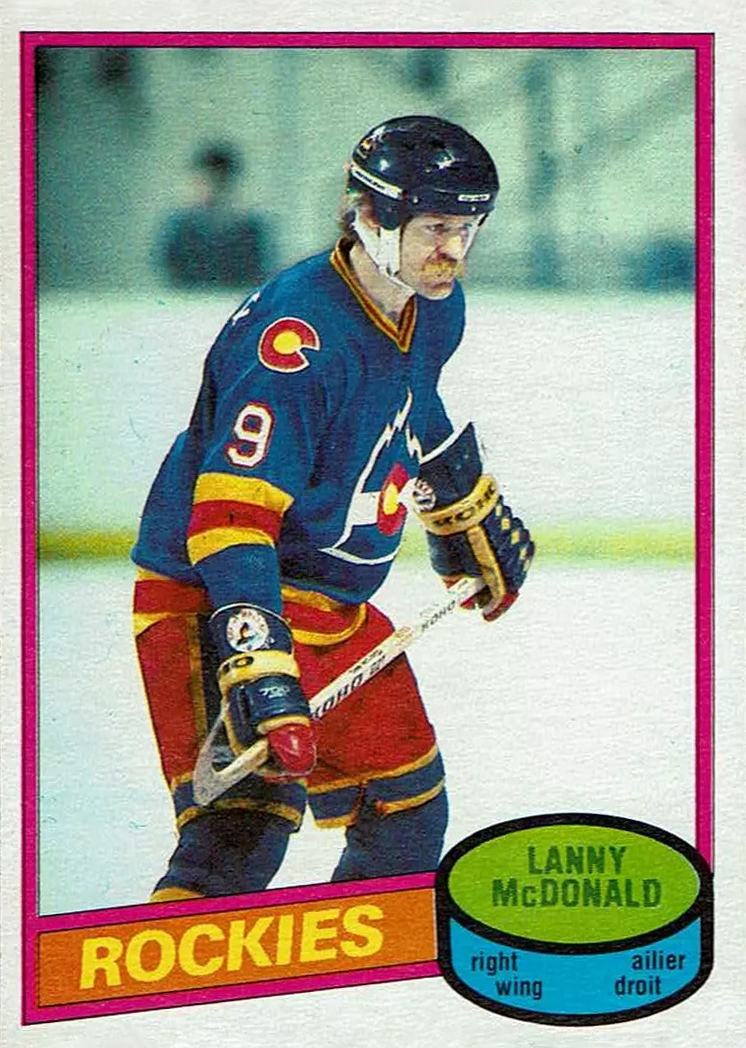Tuesday, October 21, 2025
Grit and Goals: Stan Jonathan’s Big Night vs. Don Cherry
Wednesday, September 24, 2025
Henry Boucha Scores His First NHL Goal in His First NHL Game
NHL Hockey Trivia: Henry Boucha
Saturday, August 16, 2025
Lanny McDonald’s Lone Hat Trick With The Colorado Rockies

On February 6, 1981, Lanny McDonald recorded his only hat trick as a member of the Colorado Rockies in a thrilling 6-4 home win against the Pittsburgh Penguins.
McDonald was no stranger to multi-goal games, he tallied 18 career hat tricks, including eight with the Toronto Maple Leafs (one a four-goal outing) and nine with the Calgary Flames. But during his short stay in Denver, fans only got to witness one such performance.
In the first period, McDonald opened the scoring just 5:22 in, beating Pittsburgh’s Nick Ricci with help from Merlin Malinowski. After the Penguins tied it up, McDonald struck again in the second frame with his 24th of the season, assisted by Paul Gagné and WaltMcKechnie, giving Colorado a 3-2 edge.
His third goal sealed the night, coming unassisted into an empty net with just 41 seconds left in the game. Not only did McDonald complete the hat trick, but he also collected two assists on goals by Lucien DeBlois and Mike Gillis, finishing with a five-point night. He registered five of Colorado’s 23 shots, while Rockies goaltender Al Smith turned aside 30 of 34 Pittsburgh attempts for the win.
McDonald’s path to Denver began with a December 29, 1979 trade that sent him and Joel Quenneville to Colorado in exchange for Pat Hickey and Wilf Paiement. His Rockies tenure spanned 142 games over parts of three seasons before he was dealt to Calgary on November 25, 1981, in a trade that saw Don Lever and Bob MacMillan head to Colorado.
About Lanny McDonald
Lanny McDonald played 1,111 regular season and 117 playoff games in the National Hockey League between 1973-74 and 1988-89 with the Toronto Maple Leafs, Colorado Rockies and Calgary Flames. Originally a fourth overall pick by the Maple Leafs at the 1973 NHL Amateur Draft, McDonald was inducted into the Hockey Hall of Fame in 1992.
NHL Hockey Trivia: Lanny McDonald
Bonus Round!
NHL Hockey Trivia: Colorado Rockies
Monday, November 25, 2024
Lanny McDonald's Short Time With The Colorado Rockies
On December 29, 1979, Lanny McDonald was traded from the Toronto Maple Leafs to the Colorado Rockies with Joel Quenneville for Wilf Paiement and Pat Hickey. McDonald hit the ground running (or skating) in Denver, scoring 25 goals in 46 games to finish out the 1979-80 NHL season.
Time In Denver
Lanny was with the Rockies for the full 1980-81 season and 16 games at the start of 1981-82. He scored a total of 66 goals for Colorado over 142 games (all in the regular season as the Rockies did not qualify for the post season). Interestingly, a few years later in 1982-83, McDonald scored that same number of goals in 80 games over one season with the Calgary Flames.
McDonald had just one hat trick over his time with the Rockies. On February 6, 1981, he scored three and added two assists in a 6-4 home win over the Pittsburgh Penguins. Nick Ricci was in goal for the Pens for the first two goals and the third was scored into the empty net. Lanny assisted on markers by Lucien DeBlois and Mike Gillis.
In 1980-81, the Rockies won just 22 games. Lanny scored two game winning goals that year. The first was against the Minnesota North Stars in a 4-2 win. It was his only goal of the game but McDonald had a three point night, assisting on goals by Ed Cooper and Walt McKechnie. The second was in a 5-4 win over the Hartford Whalers when he scored at 13:48 of the third period on Mike Veisor, assisted by Mike McEwen and Merlin Malinowski.
Departure From The Rockies
On November 25, 1981, McDonald was traded to the Calgary Flames for Don Lever and Bob MacMillan. He played 16 games for the Rockies prior to the trade, including a three point game at Maple Leafs Gardens against the team that drafted him fourth overall at the 1973 NHL Amateur Draft.
Interestingly, Lanny's final game with the Rockies was against the Calgary Flames. In a 9-2 blowout loss, McDonald had one point, an assist on a Steve Tambellini goal. Two days later, he was playing for the Flames.




